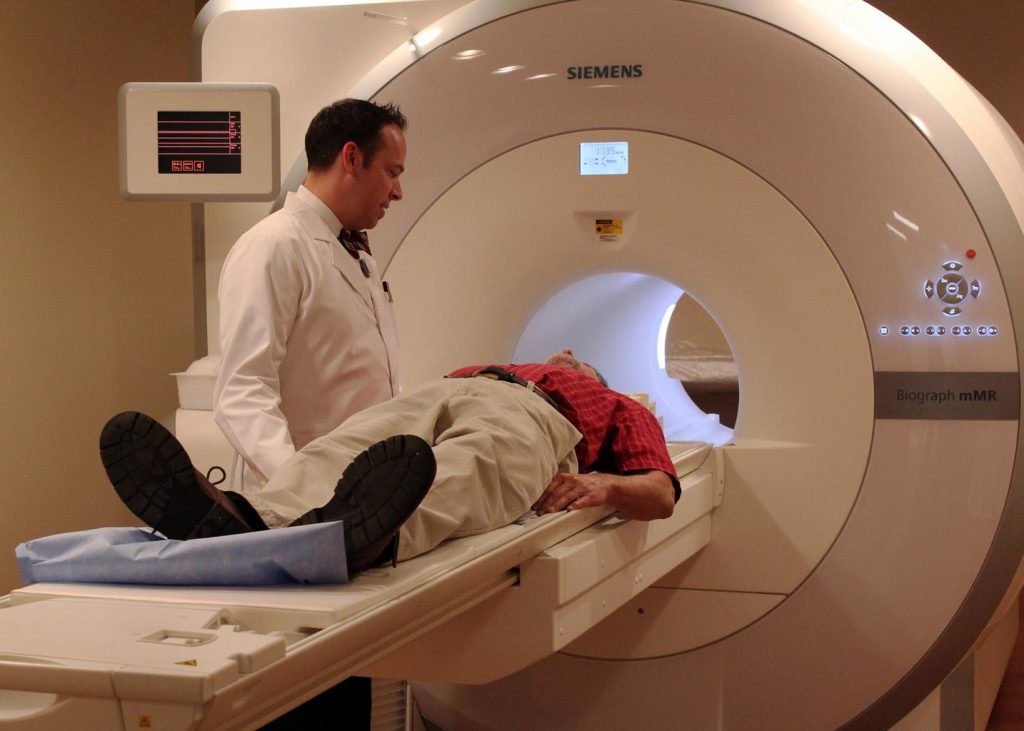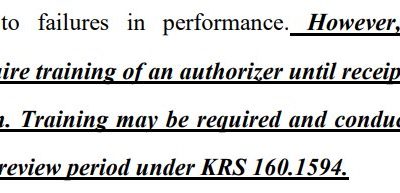It’s Saturday morning as I type these words. I’m working at a crude, homemade standing desk I fashioned from a broken cymbal stand, because sitting seems to exacerbate my symptoms: pain in my left calf, muscle twitching in various extremities, and some numbness in my left arm and cheek.
I have my cell phone within arm’s reach, firstly in case I’m suddenly incapacitated and can’t retrieve it from another room, and secondly because I’m hoping for a call from Baptist Hospital, with the results of Thursday’s battery of tests: x-rays of my neck and back, an ultrasound of my abdomen, and an MRI scan of my brain. It seems unlikely I’ll get a call on the weekend, but I’ve got the phone here regardless.
Needless to say, I’m feeling quite a lot of anxiety. This could be nothing: a pinched nerve, maybe. Or this could be very serious. I don’t know. I’ll just have to wait to find out. If there’s a bright spot in the darkness of this kind of purgatory, an aspect about which I’m not anxious, it’s the financial cost. I have health insurance. It’s a private plan that I enrolled in years ago, when I entered my thirties, at the insistence of my increasingly worried parents. I was working as an adjunct instructor at the University of Kentucky at the time, for wages of about $2200 per class. With such meager pay, I set a very high deductible on my new health plan, to keep the premiums as low as possible. Which, at the time, were roughly $60 per month, a price I thought eminently reasonable.

In the ensuing 15 years, despite never going to the doctor for anything at all, that monthly premium more than quintupled. Last year I paid about $3500 in health insurance premiums—still reasonable, I suppose, by today’s skyrocketing standards. On the other hand, my wages as an adjunct instructor at Bluegrass Community & Technical College, where I taught from 2012 through last spring, did not quintuple over the last decade and a half. Didn’t quadruple, triple, or even double. In fact, during this past academic year of 2018-19, I was paid about $2200 per class.
That’s about what adjunct faculty at BCTC earned two decades ago; they haven’t received a raise in 20 years. Meanwhile, during that span of time the Dow Jones Industrial Average has risen from approximately 10,000 to more than 26,000; the average price of a gallon of gasoline has doubled from $1.33 to $2.66; the average home price has more than doubled; and $100 in 1999, adjusted for inflation, is worth $65 today. I could go on.
Despite all this, I am reliably informed that during a Humanities Division meeting earlier this school year, BCTC President Dr. Koffi Akakpo stood in front of the assembled full-time faculty and announced that BCTC adjuncts are actually “overpaid.”
Let’s first remember that adjunct instructors at BCTC are prevented from teaching more than eight classes per year, for the express reason that keeping those faculty employed at what is essentially four-fifths time means the college needn’t provide health benefits or pay into a retirement fund, as would be required by state law if adjuncts taught a full-time schedule. They are very carefully and deliberately prevented from receiving the benefits accorded to their full-time colleagues, or, for that matter, even the most junior of the administrative staff. Thus one’s best bet, as a BCTC part-timer, is to marry someone with a health plan that provides good spousal benefits. If you have the misfortune to remain single, as I have, then you can expect to dedicate the wages from about 1.5 of your eight allowed classes to paying your annual premiums.

Of course, if you actually have to go to the doctor, there’s the deductible to consider. Mine is $2500 annually, which I reached in one day of X-rays and MRIs. Tack on several hundred dollars in lab fees and co-pays, and my health care costs this year will be, at minimum, about $7000. That’s BCTC adjunct wages for three entire classes, plus a bit extra. Put another way, my 2019 health care costs will erase nearly half of what BCTC paid me during the 2018-19 academic year.
Again: Dr. Akakpo stood in front of the assembled Humanities Division faculty and announced that BCTC adjuncts are “overpaid.”
But I consider myself quite lucky: I have insurance, at least for now. But to think of all the part-time faculty who aren’t so lucky? For many adjuncts, the situation I’ve just described is a prelude to immediate financial insolvency—to medical bankruptcy, at the least. And eventually, as Adam Harris thoroughly documented in his superb piece for The Atlantic earlier this year, the situation is a prelude to death. From “The Death of an Adjunct,” describing the memorial service for adjunct instructor Thea Hunter:
Inside Milbank Chapel, an ornate if understated auditorium with wooden walls, Thea’s friends and colleagues gathered to memorialize their friend with the model laugh. But the service was laced with other feelings, too. There was longing for times that friends wished they could do over. There was anger at the failing structures in higher education and America’s health-care system. If Thea had a tenure-track job and access to proper health insurance to be appropriately diagnosed, she might still be alive, they said.
Harris’s piece isn’t the first to document the moral horror associated with the failure of colleges to provide adequate pay and security to their faculty. Here is Daniel Kovalik writing about the death of Margaret Mary Vojtko for the Pittsburgh Post-Gazette in 2013:
With huge out-of-pocket bills from UPMC Mercy for her cancer treatment, Margaret Mary was left in abject penury. She could no longer keep her electricity on in her home, which became uninhabitable during the winter. She therefore took to working at an Eat’n Park at night and then trying to catch some sleep during the day at her office at Duquesne. When this was discovered by the university, the police were called in to eject her from her office. Still, despite her cancer and her poverty, she never missed a day of class.
There are many more stories like these, and they are well known to college administrators. Indeed, the publications of record in higher education, such as the Chronicle of Higher Education and Inside Higher Ed, have relentlessly documented the decline of adjunct instructors’ compensation and working conditions. And BCTC administrators, including Dr. Akakpo, have read these stories, and likewise they know that precisely the same conditions which killed Thea Hunter and Margaret Mary Vojtko exist at BCTC as well.
So to summarize: in the Humanities Division at BCTC, there are somewhere around 50 adjunct faculty, teaching roughly 70 percent of the courses. They haven’t received a raise in two decades. They receive no health benefits from BCTC, and must either marry well or work additional jobs to afford a private plan, which even then may be cripplingly expensive. With no term-to-term job security, these instructors are perpetually at risk of financial insolvency, especially the threat of medical bankruptcy.
But once more: Dr. Akakpo, president of BCTC, announced in a Humanities Division meeting that adjunct instructors are “overpaid.”
I’d like to give him the benefit of the doubt, but I don’t know how. I should think that the reaction of a compassionate, empathetic person, in his position, would be to try and improve the situation, to advocate strongly—to the KCTCS system office, to the legislators in Frankfort, to taxpayers, to whomever will listen—that the working conditions for adjunct instructors in higher education are literally—not theoretically—killing people, and that something must be done. I’d like to think a person in Dr. Akakpo’s position would feel deeply uncomfortable, perhaps even ashamed, by the situation.
That doesn’t seem to be the case. “Overpaid.” His word.
Dr. Akakpo: how do you sleep?





Anelia Shimansky
I forgot to mention that although true that my housing and insurance costs have doubled, since I started in 2001, while salary only increased by $75 per class (🤣), the number of local and global job opportunities have grown tremendously.
The world is very dynamic and we are no longer restricted by taking a job in our zip code. There are so many opportunities to teach English oversees and even with health problems, one can teach online, consult, and so forth.
Thus, I find adjunct status very liberating in that I can go out and use other interesting opportunities.
Anelia Shimansky
If I understand correctly, the problem is not that we are “overpaid” or “underpaid,” but the business model (aka “walmart business model”) adopted by academic institutions to hire part-timers to do up to 70% of the work and arguing that there is no true need to create full time positions.
That said, I can hardly blame Dr. Akakpo or any president before or after him.
Keith, I share the sentiment, but I feel we ARE paid fairy for the amount of work per course/per hour. Personally, I also buy private health insurance out of pocket (which is tax deductable, albeit it means little), and I have two other “gigs,” such as private lessons in English and foreign languages. I am happy to have free time available for that.
Moreover, if more full time positions are created, it will employ let’s say 25 people, while 75 adjuncts will be out of classes completely. I know I sound like a communist, but I find great joy in being an adjunct, even though I am usually at 20k year in salary.
If something is to be changed, we should go to KCTC directly, not the president.
Keith Halladay
You are correct about the business model, and I addressed the consequences of the adoption of that business model in my three prior articles for this web site. I remain uncomfortable with those consequences, and my unwillingness to accept them was a primary reason for my leaving BCTC earlier this year.
Fairness is a subjective measure, and in that sense, if you feel that $20K is appropriate, feel that you’re being paid fairly, then you are. I didn’t feel that way, and the national conversation of the last couple of decades concerning adjunct wages certainly confirms that a great many instructors share my view. And I too had other gigs—I worked six, occasionally seven days a week the last few years, in order to make ends meet. But I didn’t want that. I wanted to devote myself to my work as a teacher. BCTC prevented me from doing that.
Now, a point of fact: adjunct wages are not set in the KCTCS system office, but in the individual colleges. My source here is Dr. Jay Box, who explained that to me in an email he sent me last year after I’d complained directly to him about my (and my colleagues’) pay. So yes, Dr. Akakpo, like Dr. Julian before him, is exactly the right target.
I do agree that Dr. Akakpo is a but a functionary in the new reality, that he has been conditioned to believe, truly, that Walmart provides the model for how higher education should operate. One might say that he is only executing the plan as he’s been told to, and that whatever problems exist are much bigger than him; that point of view seems to be implicit in your position here. I understand that point of view, and to a large extent, I took it in my three prior pieces on the subject. But in this article, I chose to assume that somewhere, deep within himself, he knows that he’s wrong. And in any event, I’m unwilling to excuse the perpetrator of a moral injustice solely on the grounds that someone higher up told him to do it.
All that said, thank your for your comment. What I’ve wanted to do, in writing this series of articles, is to instigate conversation, and I continue to invite other viewpoints. Perhaps other adjuncts, and hopefully full-time faculty as well, will join in. Ideally, members of upper-level administration will address my criticisms publicly, and provide their own perspectives. They are welcome to do so at any time.
Michael Benton
Thank you Keith for your powerful series and in particular the last part.
Keith Halladay
I wish I hadn’t felt compelled to write any of it, but thank you.